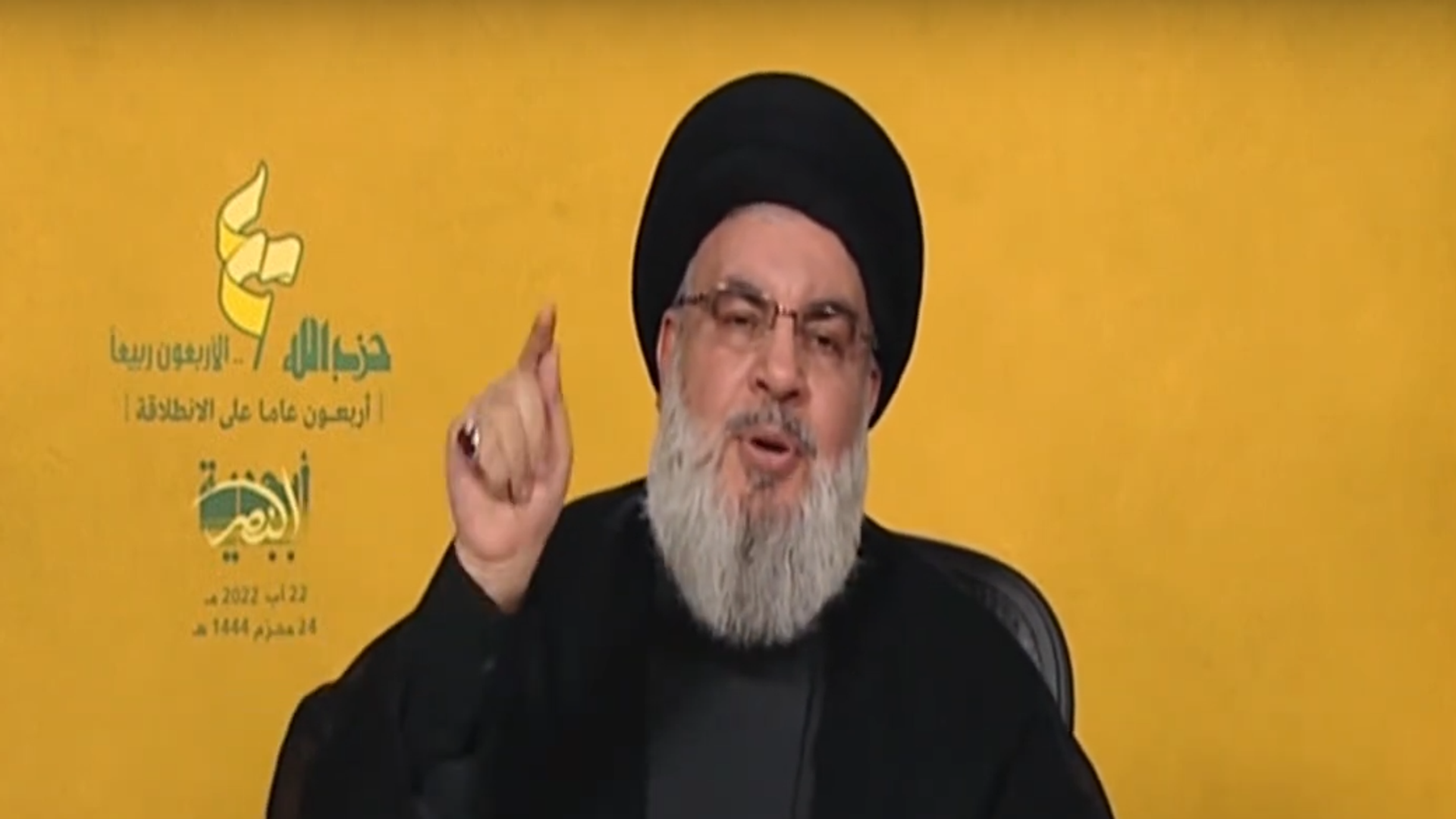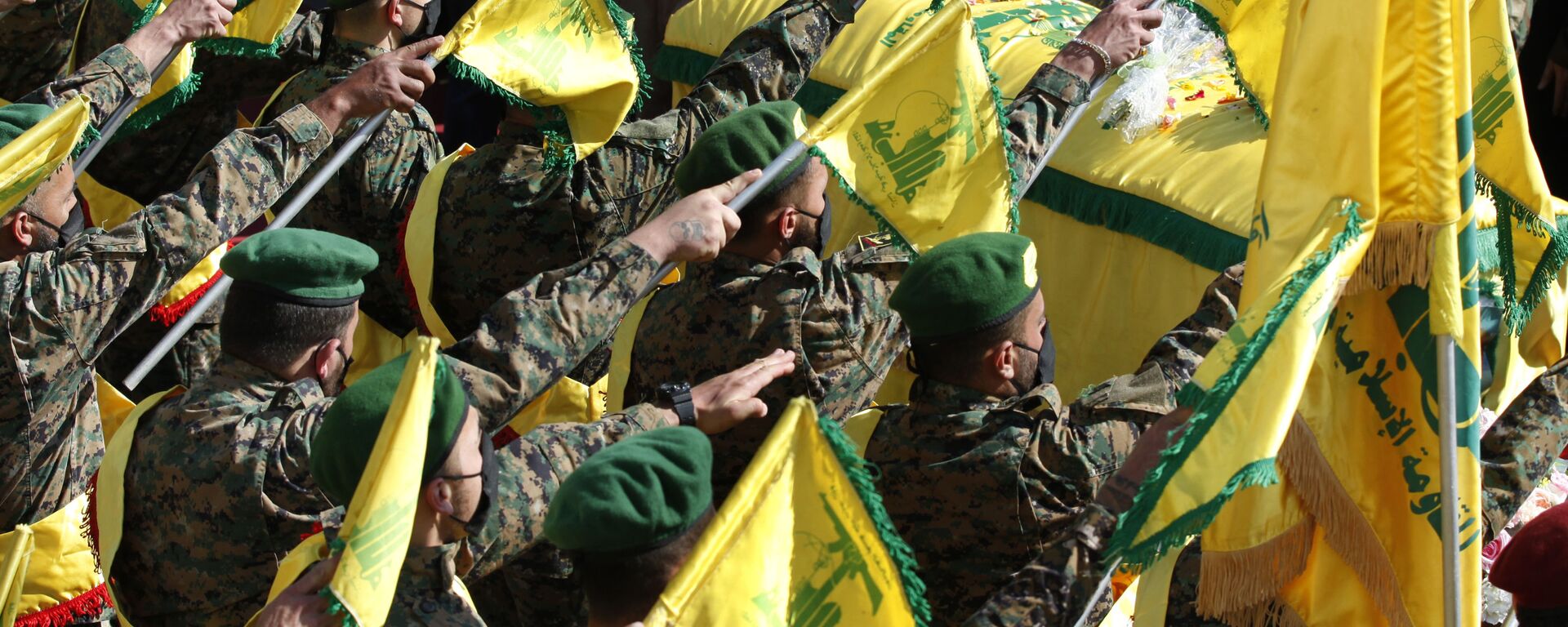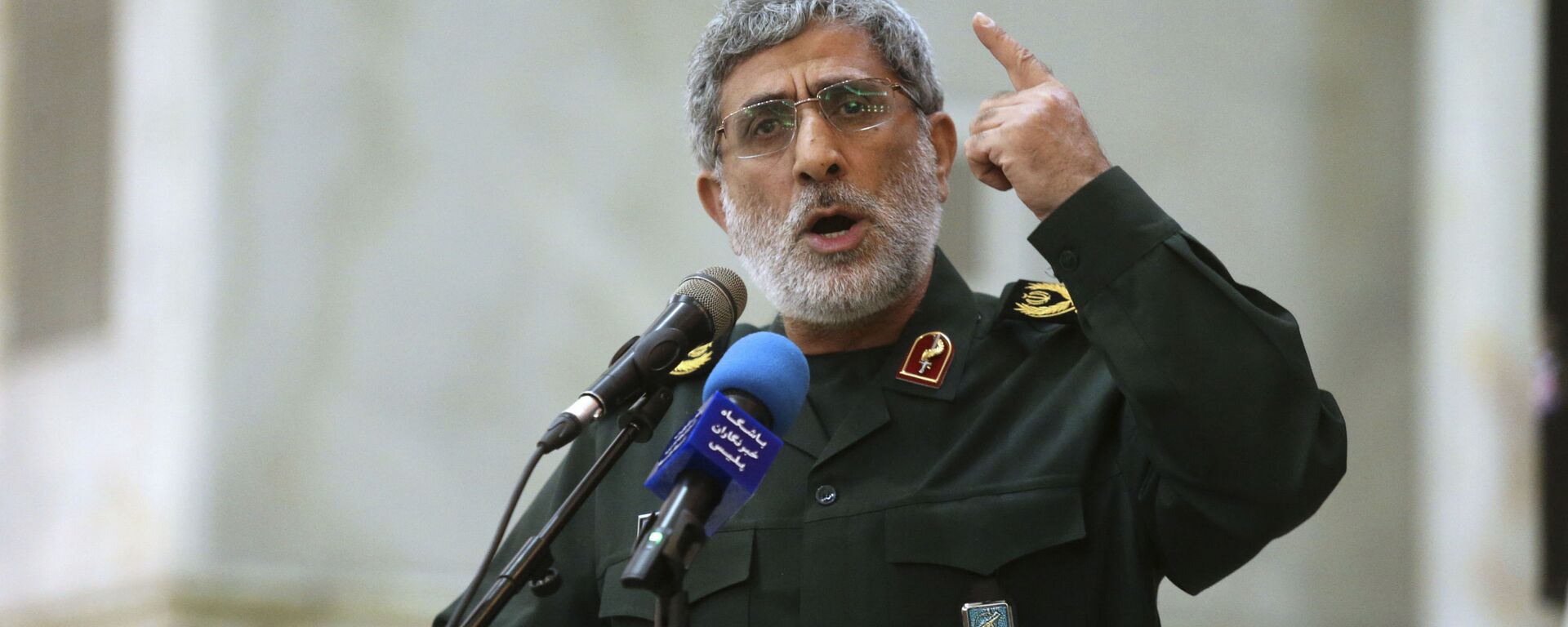https://sputnikglobe.com/20220823/hezbollahs-victory-in-1985-2000-war-shattered-idfs-air-of-invincibility-nasrallah-says-1099913026.html
Hezbollah’s Victory in 1985-2000 War ‘Shattered’ IDF’s Air of Invincibility, Nasrallah Says
Hezbollah’s Victory in 1985-2000 War ‘Shattered’ IDF’s Air of Invincibility, Nasrallah Says
Sputnik International
The Lebanese political party and militant group marked its 40th anniversary on Monday. It has spent decades engaged in conflict with Israel. 23.08.2022, Sputnik International
2022-08-23T16:17+0000
2022-08-23T16:17+0000
2023-01-15T17:26+0000
world
hezbollah
lebanon
hassan nasrallah
israel
https://cdn1.img.sputnikglobe.com/img/07e6/08/17/1099910286_0:2:1040:587_1920x0_80_0_0_6bd6f1ecd98d7c8f292a174f42e70931.png
Hezbollah’s victory over Israel in the long-running South Lebanon Conflict of 1985-2000 nailed the coffin shut on the so-called “Greater Israel project,” and shattered the Israel Defense Forces’ air of invincibility, Hezbollah Secretary-General Sayyed Hassan Nasrallah has suggested.The South Lebanon Conflict, known in Israel as the "Security Zone in Lebanon Campaign," was a long-running security crisis between Israel and the Tel Aviv-backed "South Lebanon Army" Christian militia on one side and Hezbollah and other Lebanese militia groups on the other. After Israel's withdrawal from Lebanon in 2000, the "South Lebanon Army" and the "South Lebanon provisional administration" immediately collapsed. Hezbollah emerged as a major political force and militia movement as a direct consequence of Israel's invasion of southern Lebanon in 1982.Responding to Israeli Defense Minister Benny Gantz’s warning that any Hezbollah attack on Israeli infrastructure in the Israel-Lebanon gas field dispute could trigger a new war, Nasrallah dismissed Israeli threats related to Lebanon’s maritime boundaries as “worthless.”“Our decision, rhetoric and orientation are clear and we are awaiting the coming days to act accordingly,” he said.Gantz issued Monday's warning after the militant group threatened to “sever” Israel’s hands if the country reached for offshore gas reserves in maritime areas claimed by both Tel Aviv and Beirut.In his remarks Monday night, Nasrallah warned that Hezbollah was “en route to developing the military infrastructure and capabilities to keep pace with current developments in weapons and technology.”The militant group is estimated to have upwards of 100,000 trained fighters, and as many as 150,000 unguided and precision rockets and missiles of varying range and explosive power. Israeli military planners have indicated that they expect the militants to fire up to 2,000 rockets per day in the event of a new war with Hezbollah. Israeli media including The Jerusalem Post have expressed fears that the barrages could overwhelm Israel’s advanced network of Iron Dome air defense systems.Turning to Hezbollah’s decade-long involvement in the war in Syria – where the militant group has fought alongside Syrian Army forces against a broad array of foreign-backed jihadists and rebels, Nasrallah said that the group grows more and more convinced “day after day” that it made the right choice by getting involved in the Syria conflict. “Syria is the cornerstone of the resistance front and our partner in refusing to surrender to Israeli conditions,” he said.US Pushing for Civil WarNasrallah accused the United States of seeking to start a new civil war in Lebanon by pitting the country’s military against Hezbollah.“We do not seek civil war. Of course, there are certain parties that want civil war in Lebanon. During the past 40 years, we have been trying to establish security in Lebanon and have avoided any measure that would lead to our confrontation with the Army. This is an open and permanent plan pursued by the United States to pit Hezbollah against the Lebanese Army and security forces. However, it has been foiled by the commanders of both Hezbollah and the Army. We won’t be dragged into a civil war or sectarian strife,” he said.Lebanon’s politics are built around a complex sectarian structure established by the 1989 Taif Agreement, which ended a decade-and-a-half-long civil war and established a confessional system of government in which seats in parliament and government offices are designated to the Christian, Sunni, and Shia religious communities. The agreement requires the prime minister’s seat to always be held by a Sunni Muslim, while the president must be a Christian, and the speaker of parliament a Shiite Muslim. The system is intended to represent the country’s three major religious communities, but has also led to long periods of political and social instability.Hezbollah plays a major role in politics, and is one of the two main parties representing the Shia community along with the Amal Party. Along with its domestic political activities, centered around the principles of social justice and resistance to the US and Israel, Hezbollah has sought to assist successive governments in times of crisis, for example by securing Iranian oil supplies last year as the Mediterranean nation faced crippling fuel shortages.Israel, the United States, and their allies in Europe, Asia, and Latin America, and the Arab League deem Hezbollah to be a terrorist organization, but Russia, China, Iran, North Korea, Syria, Venezuela, Syria, Algeria, and Cuba do not, with Moscow considering it a “legitimate sociopolitical force.”
https://sputnikglobe.com/20220807/hezbollah-warns-it-is-in-contact-with-gaza-fighters-amid-clashes-between-idf-islamic-jihad-1099361648.html
https://sputnikglobe.com/20220806/iran-carrying-out-at-least-15-operations-against-israel-each-day-quds-force-chief-reveals-1099343906.html
lebanon
israel
Sputnik International
feedback@sputniknews.com
+74956456601
MIA „Rossiya Segodnya“
2022
News
en_EN
Sputnik International
feedback@sputniknews.com
+74956456601
MIA „Rossiya Segodnya“
Sputnik International
feedback@sputniknews.com
+74956456601
MIA „Rossiya Segodnya“
hezbollah, lebanon, hassan nasrallah, israel
hezbollah, lebanon, hassan nasrallah, israel
Hezbollah’s Victory in 1985-2000 War ‘Shattered’ IDF’s Air of Invincibility, Nasrallah Says
16:17 GMT 23.08.2022 (Updated: 17:26 GMT 15.01.2023) The Lebanese political party and militant group marked its 40th anniversary on Monday. It has spent decades engaged in conflict with Israel.
Hezbollah’s victory over Israel in the long-running South Lebanon Conflict of 1985-2000 nailed the coffin shut on the so-called “Greater Israel project,” and shattered the Israel Defense Forces’ air of invincibility, Hezbollah Secretary-General Sayyed Hassan Nasrallah has suggested.
“The victory in 2000 put an end to the Greater Israel project and shattered the so-called ‘invincible army,’” Nasrallah said in a speech Monday night marking the anniversary of the Lebanese militant group’s founding. His comments were cited by al-Manar TV.
The South Lebanon Conflict, known in Israel as the "Security Zone in Lebanon Campaign," was a long-running security crisis between Israel and the Tel Aviv-backed "South Lebanon Army" Christian militia on one side and Hezbollah and other Lebanese militia groups on the other. After Israel's withdrawal from Lebanon in 2000, the "South Lebanon Army" and the "South Lebanon provisional administration" immediately collapsed. Hezbollah emerged as a major political force and militia movement as a direct consequence of Israel's invasion of southern Lebanon in 1982.
Responding to Israeli Defense Minister Benny Gantz’s
warning that any Hezbollah attack on Israeli infrastructure in the Israel-Lebanon gas field dispute could trigger a new war, Nasrallah dismissed Israeli threats related to Lebanon’s maritime boundaries as “worthless.”
“Our decision, rhetoric and orientation are clear and we are awaiting the coming days to act accordingly,” he said.
Gantz issued Monday's warning after the militant group
threatened to “sever” Israel’s hands if the country reached for offshore gas reserves in maritime areas claimed by both Tel Aviv and Beirut.
In his remarks Monday night, Nasrallah warned that Hezbollah was “en route to developing the military infrastructure and capabilities to keep pace with current developments in weapons and technology.”
The militant group is estimated to have upwards of 100,000 trained fighters, and as many as 150,000 unguided and precision rockets and missiles of varying range and explosive power. Israeli military planners have indicated that they expect the militants to fire up to 2,000 rockets per day in the event of a new war with Hezbollah. Israeli media including The Jerusalem Post
have expressed fears that the barrages could overwhelm Israel’s advanced network of Iron Dome air defense systems.
Elsewhere in his remarks, Nasrallah criticized the move made by some regional Arab powers to normalize ties with Israel, saying it was “everyone’s” duty to “help the revolution of the Palestinian people,” and that Lebanon would not abandon the Palestinians. “We have also supported the Palestinian refugees and emphasized their right to a dignified return to Palestine,” he said.
Turning to Hezbollah’s decade-long involvement in the war in Syria – where the militant group has fought alongside Syrian Army forces against a broad array of foreign-backed jihadists and rebels, Nasrallah said that the group grows more and more convinced “day after day” that it made the right choice by getting involved in the Syria conflict. “Syria is the cornerstone of the resistance front and our partner in refusing to surrender to Israeli conditions,” he said.
Nasrallah accused the United States of seeking to start a new civil war in Lebanon by pitting the country’s military against Hezbollah.
“We do not seek civil war. Of course, there are certain parties that want civil war in Lebanon. During the past 40 years, we have been trying to establish security in Lebanon and have avoided any measure that would lead to our confrontation with the Army. This is an open and permanent plan pursued by the United States to pit Hezbollah against the Lebanese Army and security forces. However, it has been foiled by the commanders of both Hezbollah and the Army. We won’t be dragged into a civil war or sectarian strife,” he said.
“We look forward to a state that does not yield to the American Embassy’s pressure or to any other embassy or foreign dominance,” Nasrallah said, adding that his party is ready to cooperate with “various political powers in order to build a just and capable state.”
Lebanon’s politics are built around a
complex sectarian structure established by the 1989 Taif Agreement, which ended a decade-and-a-half-long civil war and established a confessional system of government in which seats in parliament and government offices are designated to the Christian, Sunni, and Shia religious communities. The agreement requires the prime minister’s seat to always be held by a Sunni Muslim, while the president must be a Christian, and the speaker of parliament a Shiite Muslim. The system is intended to represent the country’s three major religious communities, but has also led to long periods of political and social instability.
Hezbollah plays a major role in politics, and is one of the two main parties representing the Shia community along with the Amal Party. Along with its domestic political activities, centered around the principles of social justice and resistance to the US and Israel, Hezbollah has sought to assist successive governments in times of crisis, for example by securing Iranian oil supplies last year as the Mediterranean nation faced crippling fuel shortages.
Israel, the United States, and their allies in Europe, Asia, and Latin America, and the Arab League deem Hezbollah to be a terrorist organization, but Russia, China, Iran, North Korea, Syria, Venezuela, Syria, Algeria, and Cuba do not, with Moscow
considering it a “legitimate sociopolitical force.”




